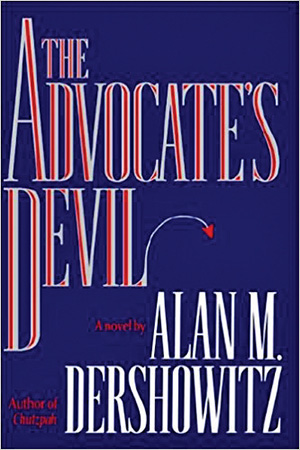
Reviewing: “The Advocate’s Devil,” by Alan M. Dershowitz. Warner Books Inc. Hardcover, 342 pages, 1994. ISBN-10: 0-446-51759-3.
Alan M. Dershowitz is considered one of America’s most famous Jewish lawyers, known for taking on defense appeals cases such as O.J. Simpson and Claus von
Bülow. He was a professor at Harvard Law, won numerous awards, and wrote many books. In addition, he is a major advocate for Israel and references the Bible and Talmud in his books.
Dershowitz’s “The Advocate’s Devil” is a chilling work of fiction that portrays several ethical challenges that a defense attorney can experience while suspecting that his/her client is guilty. Protagonist Abe Ringel is a brilliant defense attorney who is struggling with the ethical dilemma of defending his client, Joe Campbell. Campbell, an NBA Knicks basketball star, is accused of raping Jennifer Dowling, a woman with a difficult past.
At first, Ringel, along with the majority of society, believes that the accuser had claimed date rape in order to make money. This assumption, however, is disputed between Ringel and his feminist daughter, Emma. Throughout the novel, Dershowitz presents the growing generation gap following the 1960s and 1970s. He does this through the representation of Abe and Emma’s relationship. Emma constantly challenges her father with new ideas that encourage Abe to broaden his older way of thinking. Dershowitz presents the generation gap in an interesting way as Abe, who represents the older generation, had not been considered conservative in his generation. Rather, he had actually been considered to be more liberal than his peers. Nevertheless, he still struggles with the younger generation’s new mindset. While initially discussing Campbell’s case, Emma defends Dowling even though the majority of society does not. Emma is astonished that people are so ready to believe the man while discussing date rape, and therefore disputes this issue with her father. While discussing this and other similar issues with his daughter, Abe thinks about the current generation gap.
“During the late 1960s and early 1970s he really thought that he was at peace with himself about the moral issues of the day. Then came along the feminists, the radicals, the black separatists, the gay activists. Part of him resented these young upstarts for complicating his life, for making new and sometimes incomprehensible demands on his moral bank account.”
The way in which Dershowitz presents the generation gap is beautiful because even though they have different opinions, there is still much love and respect between these characters. Abe constantly praises his daughter’s independence, intelligence, and ability to speak so eloquently about what she believes in; he never writes off his daughter’s opinions; rather, he considers them. At the same time, Emma clearly has a lot of respect for her father and while she also considers her father’s opinions, she is not afraid to defend her own. This portrayal of the generation gap is inspiring because it’s a great example of how people of different opinions can peacefully interact.
Returning to the main storyline, after a tedious legal investigation, Ringel and his associates begin to suspect that Campbell is actually guilty of raping Dowling. Thus leading to the ethical dilemma of defending one you suspect is guilty.
Typically, Ringel has always lived by the theory, “Better for ten guilty to go free than for one innocent to be wrongly convicted.” However, when actually presented with a dangerous client who will continue to rape and possibly even murder more women if not put behind bars, Ringel is forced to make hard decisions. For example, when Ringel promises confidentiality to his client, he discovers evidence that points to Campbell’s guiltiness; however, he is obligated to say nothing about this evidence as a breach of confidentiality is illegal. Nevertheless, this idea is difficult for Ringel and his associates to accept because without this evidence, Campbell is sure to win his case and get away with rape. Moreover, Ringel and his associates constantly question the fact that if they win this case, they can possibly be the cause for more rapings and murders to occur. This dilemma causes Ringel to think about choosing between his values. While the lawyer in him desperately wants to win this case for his rising career and also does not want to break any of the rules that come along with being a lawyer, his human emotions strongly emerge.
““It is a personal crisis. It’s tearin me apart, both as a lawyer and as a person. It’s making me realize how much of my personal self is tied up in making my professional role as a defense lawyer. It’s making me challenge everything I’ve believed in and advocated for a quarter of a century. It’s driving me nuts.””
This conflict is thoroughly debated, questioned, and thought about throughout the novel. As someone who is interested in law and civil liberties, this story is extremely thought-provoking and educational. It prompts one to ask the question of how they would handle this situation; it makes one question their values. In addition, this story and conflict can bring up questions that are more universal such as what one values more: civil liberties or security? While this novel came out over 20 years ago and focused on defense lawyers and their ethical dilemma regarding how to represent a guilty client, the question and ethical conflict is still relevant today. “The Advocate’s Devil” is a thought provoking, captivating, and chilling page turner that can start up conversations about important values.
By Miri Wagner










